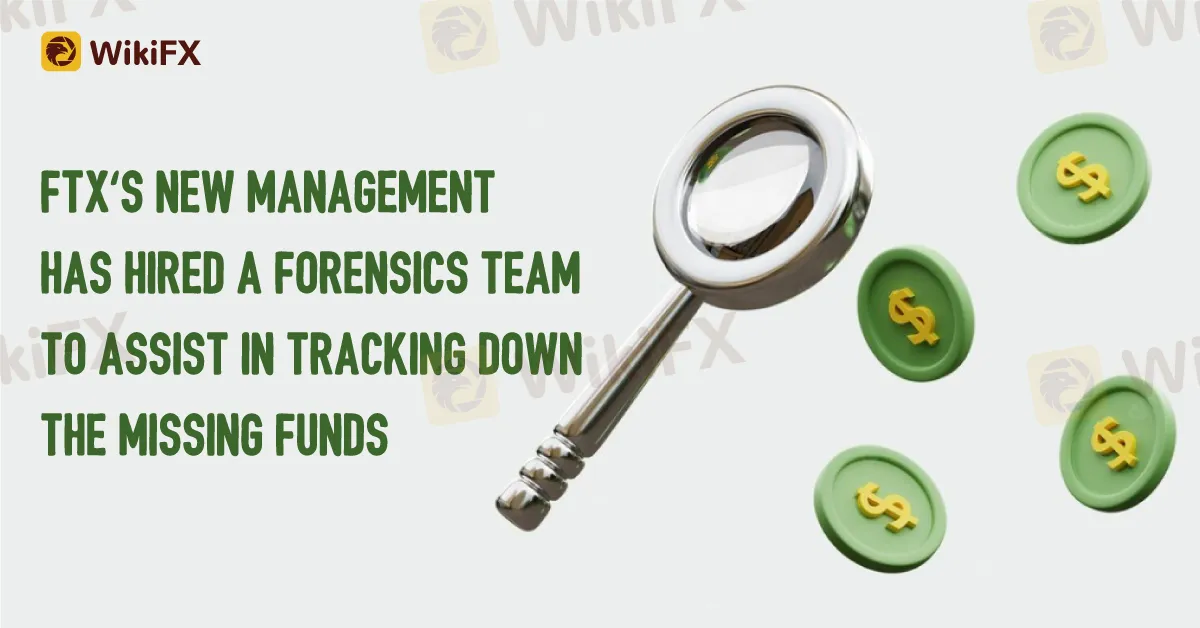简体中文
繁體中文
English
Pусский
日本語
ภาษาไทย
Tiếng Việt
Bahasa Indonesia
Español
हिन्दी
Filippiiniläinen
Français
Deutsch
Português
Türkçe
한국어
العربية
FTX's new management has hired a forensics team to assist in tracking down the missing funds.
Abstract:According to Wall Street Journey, FTX hires a forensic team to probe the money trail as there are millions of funds are still missing amid FTX’s bankruptcy.

FTXs new management has hired a team of forensic investigators from advisory firm AlixPartners to help track the billions of dollars that have gone missing from the failed cryptocurrency exchange, people familiar with the matter said.

AlixPartners, a financial advisory company, has been selected by FTX to do the job. AlixPartner will be led by Matt Jacques who is a former Securities and Exchange Commission(SEC) chief accountant. Their mission is to conduct asset tracing, identify and recover FTX's assets where possible, and work with other external teams that are investigating the same cases.

FTX, its affiliated crypto trading fund Alameda Research, and about 130 other companies entered voluntary bankruptcy proceedings in November. However, On Nov. 11 hackers drained wallets owned by FTX and FTX.US of over $450 million worth of assets. Former CEO Sam Bankman-Fried claimed in an interview recorded on Nov. 16 with crypto blogger Tiffany Fong that he was close to finding who the hacker was and that he had “narrowed it down to eight people” believing it was “either an ex-employee or somewhere someone installed malware on an ex-employees computer.”
On Nov. 22, a lawyer representing FTX debtors stated that “a substantial amount of assets have either been stolen or are missing” from FTX, and revealed at the time that blockchain analytics firms such as Chainalysis had been enlisted to help as part of the proceedings.
According to another report, As of early November, Alameda and another venture capital firm owned by SBF had nearly 500 illiquid investments in 10 companies with a cumulative value of more than $5.4 billion, according to a document obtained by the media.

According to SBF itself, all Alameda and FTX trades were for investment or hedging purposes. However, there are many procedural problems with how the funds flow from FTX to Alameda, and the low liquidity of these investments makes it difficult for FTX to recover the funds quickly, complicating the bankruptcy reorganization.
According to media analysis, Alameda's funds were largely secretly transferred from FTX's client funds, and FTX's senior managers were aware that FTX was using its client funds to help Alameda repay some of its debts.
SBF could only explain that it had not “knowingly” mixed FTX's client money with Alameda's, and denied any intent to defraud.
No matter what SBF claimed, the responsibility for the loss of investors cannot be switched.
Want to know what happen to FTX recently? Please check this article via this link https://www.wikifx.com/en/newsdetail/202211127784561416.html

Disclaimer:
The views in this article only represent the author's personal views, and do not constitute investment advice on this platform. This platform does not guarantee the accuracy, completeness and timeliness of the information in the article, and will not be liable for any loss caused by the use of or reliance on the information in the article.
Read more

The Hidden Checklist: Five Unconventional Steps to Vet Your Broker
Forex broker scams continue to evolve, employing new tactics to appear credible and mislead unsuspecting traders. Identifying these fraudulent schemes requires vigilance and strategies beyond the usual advice. Here are five effective methods to help traders assess the legitimacy of a forex broker and avoid potential pitfalls.

Doo Financial Obtains Licenses in BVI and Cayman Islands
Doo Financial, a subsidiary of Singapore-based Doo Group, has expanded its regulatory footprint by securing new offshore licenses from the British Virgin Islands Financial Services Commission (BVI FSC) and the Cayman Islands Monetary Authority (CIMA).

CFI’s New Initiative Aims to Promote Transparency in Trading
A new programme has been launched by CFI to address the growing need for transparency and awareness in online trading. Named “Trading Transparency+: Empowering Awareness and Clarity in Trading,” the initiative seeks to combat misinformation and equip individuals with resources to evaluate whether trading aligns with their financial goals and circumstances.

Malaysian-Thai Fraud Syndicate Dismantled, Millions in Losses Reported
The Royal Malaysia Police (PDRM) has received 26 reports concerning the Nicshare and CommonApps investment schemes, both linked to a major fraudulent syndicate led by a Malaysian citizen. The syndicate’s activities came to light following the arrest of its leader by Thai authorities on 16 December.
WikiFX Broker
Latest News
ASIC Sues Binance Australia Derivatives for Misclassifying Retail Clients
WikiFX Review: Is FxPro Reliable?
Malaysian-Thai Fraud Syndicate Dismantled, Millions in Losses Reported
Trading frauds topped the list of scams in India- Report Reveals
YAMARKETS' Jingle Bells Christmas Offer!
AIMS Broker Review
The Hidden Checklist: Five Unconventional Steps to Vet Your Broker
WikiFX Review: Something You Need to Know About Markets4you
Revolut Leads UK Neobanks in the Digital Banking Revolution
Fusion Markets: Safe Choice or Scam to Avoid?
Currency Calculator


